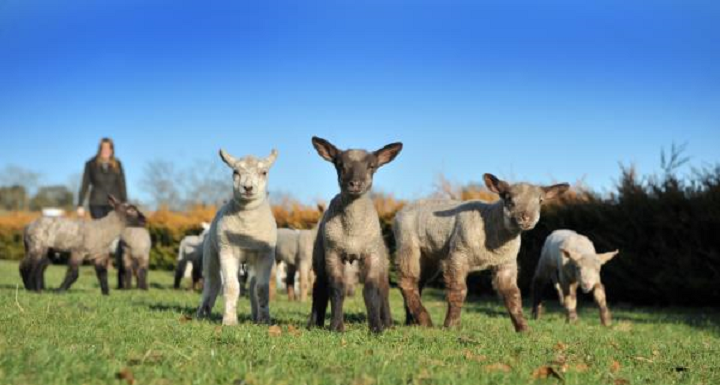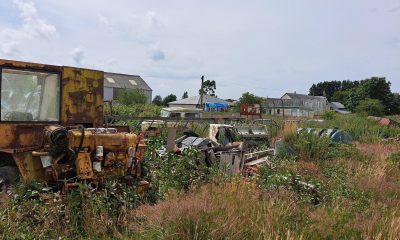Farming
‘Grow more’ Brexit claims ‘tripe’

BRITISH farmers would produce more food themselves in the event of the UK leaving the EU without a trade deal, a cabinet minister has suggested.
Transport Secretary Chris Grayling was responding to industry claims that food prices could rise sharply in the event of a no-deal Brexit.
He said this would hurt farmers on the continent as the UK was a key market.
UK WILL ‘GROW MORE’
However, if this happened, he said the UK would respond by ’growing more here and buying more from around the world’.
It comes amid fresh warnings from supermarket bosses that the UK leaving the EU in March 2019 without at least the outline of a future trade partnership would be bad for British consumers.
Sainsbury’s chairman David Tyler told the Sunday Times that a no-deal Brexit could result in an average 22% tariff on all EU food bought by British retailers.
The British Retail Consortium has said this could translate into a minimum 9% rise in the cost of tomatoes, 5% for cheddar and 5% for beef, while warning the figures could actually be much higher.
Agricultural products are one of the UK’s most important exports while the UK sources roughly 70% of the food it imports from the EU, leading to claims that items could ’rot’ at the border if there are hard customs checks or supply chains are disrupted after Brexit.
BRITAIN THE BIGGEST CONSUMER
Given the UK’s importance to farmers across Europe, Mr Grayling said it was not in their interests to see an outcome which resulted in higher costs and new obstacles to trade.
“You may remember the brouhaha over the Walloon farmers when they objected to the Canadian trade deal. I had a look to see who their biggest customer was – it was us,” he told the Andrew Marr Show on BBC One.
“We are the biggest customers of the Walloonian farmers – they will be damaged if we don’t have a deal.”
But if the UK ended up without a deal, which would see it default to World Trade Organization (WTO) rules, Mr Grayling suggested domestic producers and retailers would respond by rethinking their sourcing.
“What it would mean would be that supermarkets bought more from home, that British farmers grew more and that they bought more from around the world,” he added.
“What we will do is grow more here and buy more from around the world but that will mean bad news for continental farmers and that is why it will not happen – it is in their interests to reach a deal.”
TARIFF-FREE TRADE VITAL
The British Retail Consortium said maintaining tariff-free trade with the EU during a post-Brexit transitional period was vital to preventing the UK facing potential tariffs straightaway of up to 40% on some beef and dairy products under WTO rules.
The trade body, which recently published research on the subject, acknowledges forecasting the consequent impact on food costs is complex and a range of other factors would have to be taken into account.
But it said there was a risk that domestic producers could put up their own prices to increase their competitiveness and if this happened, the cost of items like tomatoes could rise by up to 18%, broccoli by up to 10% and cheddar by a maximum of 32%.
A spokeswoman said that while retailers could review their buying policies in the medium to long term to adjust, it was “very unrealistic to expect farmers to make up the surplus of produce straight away”.
‘NO NEED TO WORRY’
But writing in the Sun on Sunday newspaper, the former minister and prominent leave campaigner John Redwood said that although consumers may see their shopping basket change if there is no trade deal, ’there is no need to worry, our farmers will boost their output’.
“They don’t understand the cards in our hands as the EU’s main customer,” he wrote. “The government will be able to give us all a tax cut out of the tariff revenue it collects, so we need not be worse off.”
However, those more closely connected with farming have responded with incredulity to the blasé reassurances of Mr Redwood and the claims made by Chris Grayling.
GRAYLING TALKING ‘TRIPE’
Apple growers have already complained about a shortage of labour for this year’s apple harvest, with British jobseekers unprepared to face the rigours of doing jobs usually performed by migrant labour who have turned their back on the UK post-Brexit.
Lawrence Olins, the chair of British Summer Fruits, whose members provide 97% of all home-grown berries and soft fruit to the UK market, pointed out that UK growers had been unable to source labour this year while still a member of the EU. The prospects for finding sufficient labour after Brexit were even worse, he said.
Mr Olins said: “I have farmers who are moving to Portugal because they know they are able to hire people from the subcontinent. They know this. To hear Grayling come out with this tripe beggars belief.”
‘OUT OF TOUCH WITH FARMING’
While acknowledging that Brexit could create opportunities for UK farmers in some sectors in the medium to long term, Minette Batters deputy president of the NFU responded to Mr Grayling, saying: “I would say he’s out of touch with farming. Of course we want to produce more, but have the rest of the cabinet got the same view? I support what he is saying, but it’s quite hard to know how this translates. I’d like to know what Philip Hammond thinks, what Michael Gove thinks of this.”
Ms Batters continued: “This is not about ploughing the verges to grow more food, it’s about the absence of any food policy.
“We haven’t had a food policy for 43 years,” she said, pointing out that national food and environmental policy has been led by the EU since the UK joined the European Economic Community in 1973.
And, lest those cheerleading Brexit reach for the green ink and the word ‘traitor’, as they tend to when words they want to hear are subject to scrutiny, the NFU’s Director of EU Exit and International Trade Nick von Westenholz said: “UK farmers know that there will be opportunities arising from leaving the EU, including increasing the amount of home-grown food consumed by the British public. However, given the extent of our trade in food with the EU, failure to secure a comprehensive trade deal would cause considerable disruption to farming in the UK. Although there is some scope for import substitution, farming operates on long timescales. For example, the first crop to be produced post-Brexit will be in the ground in less than a year.
“Furthermore, due to the amount of food we import that isn’t grown here, as well as issues such as managing carcass balance, simply upping production to quickly offset any reduction in food imports isn’t feasible.
“In the long term Brexit will offer new opportunities that farmers will be eager to take, but in the meantime the UK must maintain clear and free trade flows with the EU where the vast majority of our food exports are headed. Over the next few weeks, the NFU are embarking on a series of Brexit Roadshows across the country in which we will discuss the sorts of challenges and opportunities facing UK farmers in the near future.”
SHEEP FARMERS COULD BE WIPED OUT
FUW President Glyn Roberts, whose members number many of those small hill and family farms that would be most affected by no deal and a switch to World Trade Organisation (WTO) tariffs criticised Chris Grayling’s comments, providing a stark warning that sheep farmers were at risk of being wiped out unless commitments were given to match subsidies already received via CAP.
The FUW said that the transport secretary seemed to have ignored research commissioned by the government that showed the ’cataclysmic’ impact a hard Brexit would have on British farming.
Glyn Roberts, the FUW’s president, said: “Mr Grayling seems unaware of the results of the economic modelling commissioned by his colleagues in Defra, which paint a far more complex picture for the UK’s many agricultural sectors, and suggest in some ‘harder’ Brexit scenarios UK food production would collapse.”
Mr Roberts pointed out that the economic modelling of Defra and detailed data published by the Agricultural and Horticultural Development Board released on October 10, ’predict pretty cataclysmic collapses in many or most agricultural sectors in the event of harder Brexit ”no-deal” type scenarios’.
The FIPRA report, which The Herald covered in August, revealed that Welsh sheep farmers would most likely be devastated by a hard exit from the single market, with tariffs for Welsh lamb – the overwhelming majority of which is exported to continental Europe – going from zero to 32% overnight, even on WTO most-favoured nation status.
FARMS’ BOTTOM LINES CUT
The AHDB report, to which Mr Roberts referred, suggested that average farm profitability could drop from £38,000 to £15,000 a year in the worst case scenario as a result of policy and performance challenges that come from Brexit, modelling work has revealed.
AHDB’s latest Horizon report, Brexit scenarios: an impact assessment, for the first time quantifies the potential impact of Brexit on UK farming businesses.
It maps out a range of possible post-Brexit situations and models their effect on Farm Business Income (FBI) across agriculture and horticulture’s levy-paying sectors.
The analysis projects the effect of different trading arrangements, farm support measures and labour availability.
They range from a ‘business as usual’ approach with current levels of support; a liberal approach to trade with tariff-free access to the UK and reduced support; to a cliff-edge Brexit, reverting to WTO regulations and with dramatically reduced support payments.
The model allows AHDB to re-run the scenarios in future as more detail of policy decisions in those key areas emerge, to form a more accurate picture for the industry. AHDB will also later publish specific results for Scotland using Farm Business Survey data.
Under the three scenarios outlined in the report, changes in the UK’s trade relationships will impact farmers’ bottom line when the UK leaves the Single Market, whether or not a Free Trade Agreement is negotiated with the EU.
Policy decisions also leave sectors where direct support has been a key part of farm revenues such as beef, lamb and cereals, particularly vulnerable.
Mr Bicknell added: “Buzzwords like competitiveness, resilience, productivity are not new to agriculture but Brexit brings renewed focus on farm performance. Do nothing and businesses that are currently profitable run the risk of heading into the red. There is plenty that individual businesses can do now to get fit for the future.”
‘NO DEAL’ FAVOURS BIG BUSINESS
One of the key challenges facing government will be protecting farmers from a hard landing, no matter what Brexit strategy is followed and whether or not a trade deal can be done.
Even the best trade deal will not be on the same terms as the current single market access, as EU governments have made clear, that means there will have to be a substantial structural adjustments to both the support given to farmers by the devolved governments and English parliament and steps to preserve small farms – which are a significant economic driver of rural economies.
The AHDB document highlights the risks faced if Britain leaves the EU without easy, tariff-free access to the single market, with Less Favoured Area livestock farm incomes particularly hard hit, falling to negative figures in the worst case scenario. Lowland livestock farms fare little better, with incomes falling to less than £4,000 in two of the three scenarios looked at, and across all UK farm types, incomes more than halve under an ‘extreme’ Brexit scenario.
But while results differ on a sector-by-sector basis, the top 25 per cent of businesses, regardless of sector, remained profitable under every scenario. In short, a hard Brexit favours large farmers – such as the grain barons of east England – and larger ‘industrial’ dairy and livestock farmers.
Glyn Roberts said: “The EU and UK sent a letter last week to WTO members outlining an agreed position on how quotas should be split when the UK leaves the EU, but the USA and other WTO members, including Canada, Argentina, Brazil and New Zealand, had already written to the EU and UK WTO ambassadors stating their objections to the proposals.
“The letter, signed by seven of the WTO’s 164 members, states ‘Such an outcome would not be consistent with the principle of leaving other [WTO] members no worse off, nor fully honour the existing TRQ access commitments. Thus, we cannot accept such an agreement’.
“This underlines the fact that the current EU negotiations are just the start of a complex process that would normally take decades.”
Farming
E-Tickets now on sale for Pembrokeshire County Show 2024

E-TICKETS are now on sale for this summer’s Pembrokeshire County Show, the largest county agricultural show in Wales. Preparations are coming together well for what is set to be a fantastic two days of livestock, competitions, attractions and much more.
General entry tickets for the show, taking place on Wednesday and Thursday, 14 & 15 August, are now available at an ‘early birds’ rate online from the website. Ticket prices have had to increase slightly to cover costs but still remain below 2019 charges. The early bird rate for Adults is £15, children £8 (5-16 years), Carers as well as children four years and under are free. Please visit: www.pembsshow.org to purchase your e-tickets.
Adam Thorne, President of Pembrokeshire Agricultural Society said, “At the event in August visitors will be able to tickle their tastebuds in the Castell Howell Food Hall, marvel at the livestock classes, enjoy watching the dog agility, be wowed by the showjumping, explore the horticulture, arts and crafts entries.
Shop ‘til they drop in the Country Market area, which will showcase over 40 quality local and award winning product and craft stalls and much more.”
Pembrokeshire Agricultural Society Membership packages are also available and these include admission to the Show and the Members’ Area. Purchasing membership of the society will support its aim to promote, advance and improve agriculture, horticulture and rural crafts and skills by the improvement of livestock and the demonstration and showing of livestock, machinery, crafts, products, methods and processes connected with agriculture and agricultural education in particular by the holding of an annual show. Full details are available on the website: Become A Member | Pembrokeshire County Show | Pembs Agricultural Society (pembsshow.org)
Putting together this event is hard work and requires an enormous effort by the staff, volunteers and trustees of Pembrokeshire Agricultural Society. The Society is indebted to so many for their commitment and support in helping host the event.
A special mention must go to the county show sponsors. Pembrokeshire Agricultural Society is proud to have many local, regular, sponsors who make the event possible.
Sponsorship Director, Richard Cole, said, “Sponsorship and Pembrokeshire County Show have been a successful combination for the last 45 years. Sponsors have enjoyed promoting their businesses through the varied mediums of banners, announcements, show rings, buildings, equine and livestock classes and championships over the years. It isn’t too late. If you’d like to discuss becoming a corporate sponsor please complete the form on our website: www.pembsshow.org.”
Farming
Pembrokeshire Agricultural Society in search for county’s top progressive farmers

IF you farm in Pembrokeshire and can demonstrate your farm’s use of the latest technological methods to promote progressive, sustainable agriculture then the Pembrokeshire Agricultural Society encourage you to enter the prestigious Baron de Rutzen Award.
Adam Thorne, Pembrokeshire County Show President, said, “We are looking for local Pembrokeshire farmers, under the age of 45, who can demonstrate their farm’s use of the latest technological methods to promote progressive, sustainable agriculture. They also need to show consideration for the environment and habitat sensitivity on their farm as well as present an aesthetically pleasing example of farming in the county. The competition welcomes all livestock and arable sectors to take part.”
Last year’s winners of the Award were Mark and Caroline Davies of Little Newcastle, Haverfordwest. They milk 230 pedigree Holsteins through a fully automated system. They rear their own replacements and also have a small beef enterprise. The farm is all grassland and they follow a strict reseeding and liming policy to optimise the yield from their multi-cut silage system. The couple place significant emphasis on animal health, husbandry and breeding to maximise the efficiency of their system.
Baron John Fredrick De Rutzen was President of Pembrokeshire Agricultural Society in 1936 and the Baron de Rutzen Trophy was produced in his memory. The third Baron served in the Welsh Guards and tragically died, aged 36, in 1944.
This year’s entrants must be fully practising farmers within the county of Pembrokeshire and were under the age of 45 years on 1 January 2024. Entries can either be by nomination or direct application online on the Pembrokeshire Agricultural Society website. Click here to apply: Baron de Rutzen Award | Pembrokeshire County Show | Pembs Agricultural Society (pembsshow.org)
The closing date for nominations and applications is at noon on Wednesday, 29 May 2024.
Farming
Pembrokeshire Agricultural Society elect new president

ARABLE and beef farmer, Adam Thorne, has been unanimously elected to become the new President of Pembrokeshire Agricultural Society for the year ahead. Adam is the third generation of his family to hold the position.
During the Annual General Meeting of Pembrokeshire Agricultural Society, held last week on the Pembrokeshire Showground, Mr Tim John and his wife Margaret John were also voted in as Presidents elect.
Adam Thorne has had a long association with Pembrokeshire Agricultural Society. After visiting the show as a toddler, then helping show the family’s pedigree Herefords, his uncle got him into helping him with stewarding in his early teens. From there he progressed to being a Steward with his own section, Commercial Cattle, and then also the Butcher’s Lambs section.
From stewarding, Adam became involved with committee work, starting as an Executive and then on to the former Finance and General Purposes Committee. He has been Chairman of the Estates Committee for 12 years and is now a Board member and a Trustee.
Adam said, “I am proud of my long association with Pembrokeshire Agricultural Society. I am the third generation to now be President, following my late grandfather, Walter Thorne, my father, Robert Thorne and more recently my uncle, George Thorne. I am looking forward to my year in the prestigious position.”
Away from his work with the society, Adam runs the family’s arable and beef farm in Robeston West, Milford Haven. He has been heavily involved with Tiers Cross YFC from an early age, having been Club Secretary twice and Chairman. He has also sat on Pembrokeshire County YFC Committees and the Wales YFC Rural Affairs Committee.
The 2024 Pembrokeshire Agricultural Society officeholders, announced at the AGM, include Miss Ffion Edwards who was awarded the role of Ambassador at last year’s show. Ffion, a nurse from Maenclochog, has enjoyed many years of attending the county show and believes that there are so many good elements to it. Ffion has been a member of Llysyfran YFC for 15 years and enjoys every aspect of young farmers – trying new experiences, competing and travelling to name a few. Mrs Nicola Owen was also elected as the Honorary Treasurer.
Brian Jones, the outgoing Pembrokeshire Agricultural Society President, took the opportunity to thank everyone who had helped and supported him throughout his presidency. During his year as President, Brian and his wife Helen, raised a tremendous amount of money for various charities including the Pembrokeshire Agricultural Society, RABI, Tir Dewi and the DPJ Foundation. Brian also gave his assurances that Castell Howell will continue to sponsor the Food Hall for future years.
Pembrokeshire County Show, the largest county agricultural show in Wales, will be held over two days again this summer on 14 and 15 August. Everyone is invited to attend the celebration of rural life in the county.
Pictured (left to right): Ffion Edwards the Ambassador for 2024; Adam Thorne, President; Margaret and Tim John, the Presidents Elect.
-

 News4 days ago
News4 days agoPolice and air ambulances at ‘serious incident’ at West Wales school
-

 Business1 day ago
Business1 day agoLargest Welsh port appoints communications and marketing director
-

 Crime3 days ago
Crime3 days agoPembrokeshire pensioner accused of 17 sexual offences against children
-

 Crime3 days ago
Crime3 days agoAll three school stabbing victims discharged from hospital, police confirm
-

 Community5 days ago
Community5 days agoCounty Hall to offer space for community banking
-

 Crime6 days ago
Crime6 days agoBrian Davis: Wanted on suspicion of commercial burglary
-

 Education7 days ago
Education7 days agoTarget of 1m Welsh speakers by 2050 is “almost impossible”
-

 Sport5 days ago
Sport5 days agoSwifts eyes on double.

























